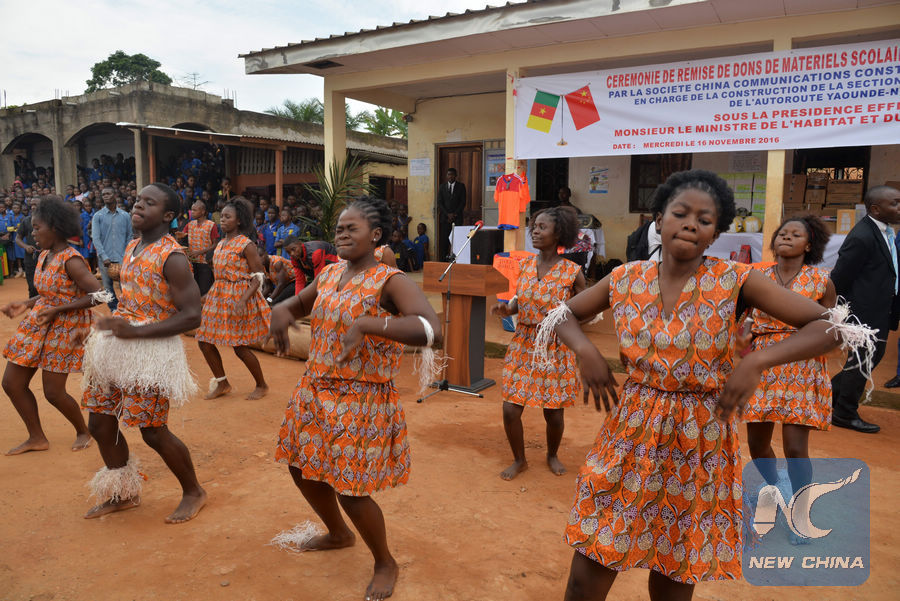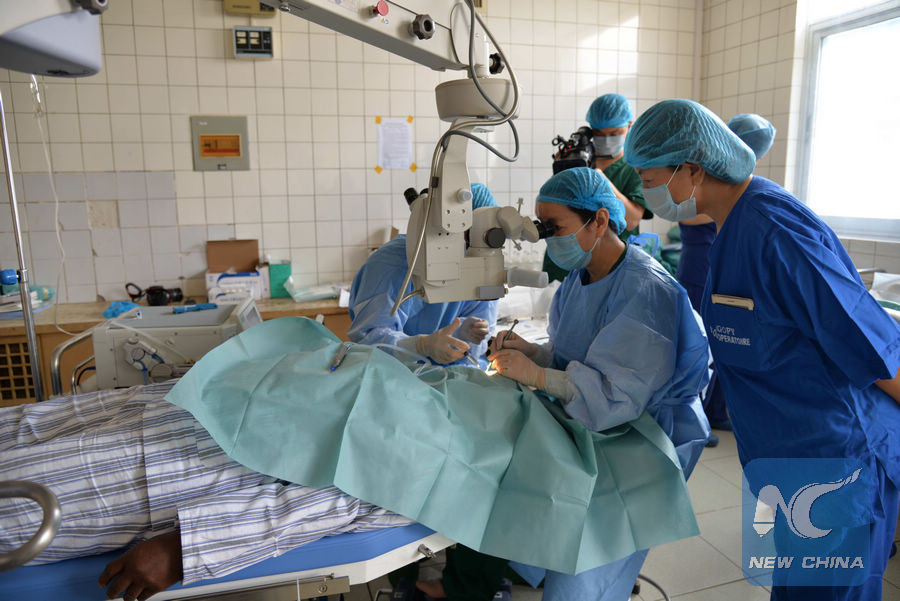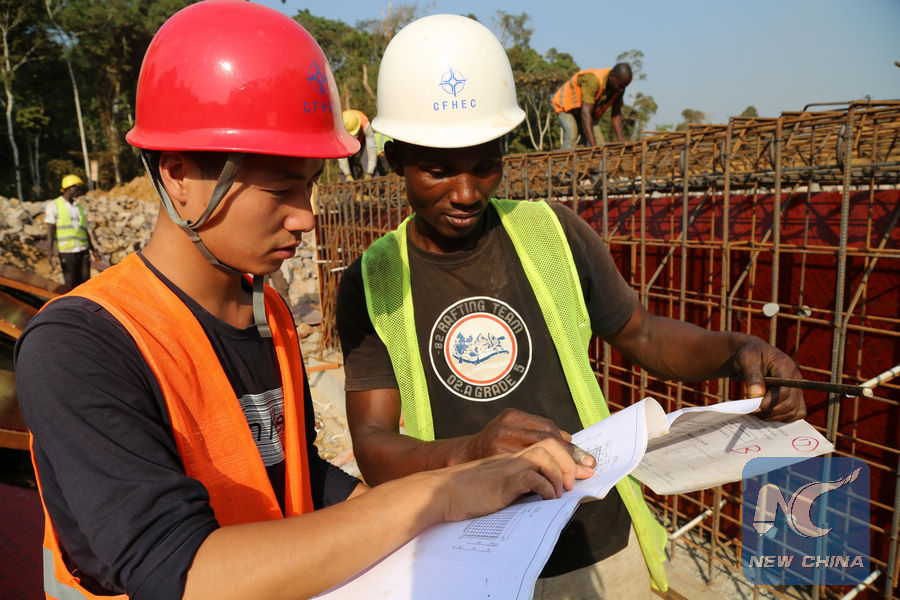
File photo shows a donation ceremony in Yaounde, capital of Cameroon in 2016 by China Communications Construction Company Limited. The donation included teaching and sports materials to D'Ahala Public Middle School. (Xinhua/Huang Yanan)
by Arison Tamfu
YAOUNDE, April 13 (Xinhua) -- Thirty-year-old Howa Boka Ali sat baby-in-lap, explaining how terror group Boko Haram burned her house in Nigeria, destroyed her crops, stole her domestic animals and killed ten of her family members in one night.
"I lost everything, everything. It was like hell. I am the only one of my parents' children who is still alive. I escaped with my husband and children to come here," she said.
A mother of five, who is now as far from her dream of becoming a "big business woman" as she is from home, Ali told Xinhua her story at Minawao camp, the only official refugee camp in Cameroon's Far North region hosting over 57,000 Nigerian refugees.
Cameroon, together with Nigeria, is suffering the adverse consequences of Boko Haram insurgency. Since March 2014, Boko Haram's attacks on Cameroonian soil have caused multiple displacements in the country's Far North region and neighbouring Nigeria.
In Minawao camp, heartbreaking stories of Boko Haram atrocities have become ordinary but Ali said she feels "much safer now."
Ali's neighbour, Esther Elisha, 34, recalled her difficult times were when they first arrived the camp.
"There was nothing to eat. Children were dying of malnutrition every day," Elisah said.
That was when Chinese aid stepped in.
In a bid to alleviate the food insecurity, in October 2017, China made a contribution of about 5 million U.S. dollars according to Aliou Diongue, bureau chief of World Food Programme (WFP) in Maroua, chief town of Far North region.
"It (Chinese contribution) came in the critical period," Diongue told Xinhua.
"The aid helped WFP assist more than 245,000 people in the Far North especially the local vulnerable people and the refugees."
"It has changed the lives and behavior of the people in the Far North," Diongue said.
"We are happy for what they are doing for us because we receive food every month," Elisha said.
Ali's youngest child, the one-year-old Mustapha Ali is one in the camp who cherishes Chinese aid. Everything about her changed when "quality rice" was sent from China for the refugees.
"She adores rice. She stopped crying and growing fatter and happier after consuming the rice. We were extremely happy this month when we were offered the rice from China. It was quite different and delicious," Ali said.

File photo shows Chinese doctor Zhang Suhua (2nd R) making cataract operation for one patient at Gynaecoloy, Obsterics and Pediatrics hospital of Yaounde, capital of Cameroon, May 31, 2016. (Xinhua/Huang Yanan)
Apart from food insecurity, education also suffered greatly in the midst of the crisis. According to the United Nations, at least 92 primary schools remain closed because of the insecurity in the Far North. It is estimated that about 23,000 school-aged children are out of school.
Chinese aid is gradually changing the situation.
The assistance has enabled the establishment of educational facilities in the camp and areas that host internally displaced persons (IDPs) and many of the children are now returning to school.
Five-year-old Musa Ali is one of the pupils. Before, he detested school but was attracted by the availability of food in schools. Now, he dreams big.
"I want to study hard. There is always something to eat when you go to school," he said, adding that he wanted to become an senior official in the future.
"With contribution from China, we were able to increase school enrolment. We are assisting about 76,000 school children in the three most affected departments in Far North region," Diongue said.
"We assist them in maintaining the school functioning. Some children did not want to go to school because they had nothing to eat when they go to school. Now there is something to eat and they are coming. We are assisting about 140 schools."
According to Midjiyawa Bakari, the governor of the Far North region, China is also contributing to the peace efforts in the region, helping create an enabling environment for peace and stability.
"Some 40,000 out of about 60,000 Nigerians who fled into Cameroon before Nigeria's February elections, have already returned home successfully. Calm is returning here," Bakari said.

File photo shows a Chinese worker and a Cameroonian worker working together at the construction site of Yaounde-Douala Highway construction project funded by concessional loan of the Chinese government on April 29, 2016. (Xinhua)
The number of suicide attacks, kidnappings, targeted killings and village destruction committed by Boko Haram have decreased, said Diongue, who added displacements are still recorded in areas of enduring insecurity.
So WFP needs more money to sustain this increasing demand of food in the Far North and to assist those children who have been under nutrition programme, Diongue said, stressing more funds are needed in order to alleviate the poverty of this population.
Africa hosts about a third of the world's refugees and IDPs, UN Secretary-General Antonio Guterres said in February when addressing the 32nd Ordinary Session of the Assembly of the African Union.
In recent years, China has helped ease the refugee burden in Africa through donations of food, vocational training and other means, encouraging vulnerable populations to become self-reliant.

